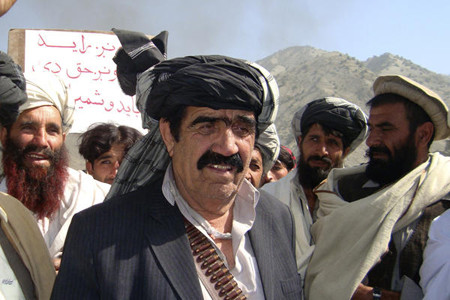By Tom A. Peter
For a fifth day, supporters of losing parliamentary candidate Pacha Khan Zadran have blocked a major road in eastern Afghanistan. They've set tires ablaze and refused to let traffic pass – threatening to keep the road closed until the government reinstates the 1.3 million votes tossed out due to fraud, a decision Mr. Zadran's supporters say cost him the election.

In this image made on Monday, Oct. 25, supporters surround parliamentary candidate Pacha Khan Zadran, center, as they block a major transit route in Paktia province, east of Kabul, Afghanistan. (Photo: Nashanuddin Khan/AP)
The local protest in favor of a prominent warlord is more evidence that the Afghan parliamentary election, trumpeted by the US as proof of a steadily emerging democracy, was marred by fraud and in some cases involved candidates unwilling to take defeat peacefully.
Zadran is from Paktia province and rose to power during the war against the Soviets along with a raft of militia commanders that remain some of Afghanistan's most powerful people to this day. While the defeat of a man like Zadran might be seen as evidence that Afghan's are turning away from leaders whose power flows from the barrel of a rifle, preliminary results from the Sept. 18 parliamentary elections instead indicate the old guard of warlords is simply being replaced.
Many of the apparent winners (election results have not yet been certified) belong to a new generation of Afghan warlords that has risen since 2001 and attained wealth and power through NATO security contracts and lucrative reconstruction deals.
“This is a new situation in Afghanistan. You saw in the last parliamentary elections that there were too many new people who spent a lot of money, millions of dollars, and they got this money over the last nine years,” says Waheed Mozhdah, a political analyst in Kabul. “It’s a kind of new generation of warlords and this generation is the harvest of the American presence.”
New warlords see opportunity for fortune
This new generation of warlords – most of whom dislike that title and prefer terms like “powerbroker” instead – are young men, many in their early 30s, who seized the international presence here as an opportunity to make their fortunes.
They provide social services in their areas of influence by supporting the poor, providing gifts to newly married couples, and often intervene in legal disputes. They also maintain private armies that are known for violent conduct and many of whose members are believed to be involved in smuggling drugs and running protection rackets.
In Kanadahar and Uruzgan provinces alone, the newly elected members of the parliament are dominated by loyalists of Ahmad Wali Karzai and Matiullah Khan, both considered to be among the strongest of the new generation of warlords. In Kandahar, at least five of the 11 victors had ties to Mr. Karzai and in Uruzgan all three members of parliament had ties to Mr. Khan.
Meanwhile, prominent members of the old guard who were previously seen as immovable figures in the Afghan political landscape were defeated in their bids for a seat in the parliament. Aside from Zadran, the losers included former strongmen like Zalmai Toofan of Kabul and Wali Jan Sabari of Helmand.
How warlords shape policy
As the election officials prepare to announce the final results in the coming weeks, the question remains just how much the new lawmakers will be able to accomplish.
“Everyone knows that the warlords are much more powerful than the members of parliament,” says Haji Askar Khan, a tribal elder in Kandahar. “Members of parliament are just representatives to the nation’s House. It is up to the powerful people if they help or not.”
A former high-level government official in Kandahar says few politicians can successfully defy the political interests of the men with their own militias.
“Out there I was always saying that if you can rebuild Kandahar, you can rebuild the whole country,” says the former official, who asked not to be identified.
Almost immediately after taking office, however, he began butting heads with two of the province’s most prominent figures – Ahmad Wali Karzai, a younger brother of President Hamid Karzai, and Abdul Raziq, a border police colonel in the town of Spin Boldak whose rivals accuse him of profiting from smuggling and using violence to intimidate political opponents.
The two men wanted to control how he shaped policy at almost every level, says the former official.
After less than six months, the official was recalled to Kabul by President Karzai. While it was not expressly stated, the former official says it was made clear that he was being removed from his position because of his clashes with the two men.
“When you go to an area controlled by Commander Raziq, you will see the people’s hatred of the government,” says the official. “Commander Raziq is the representative of the government out there, but he’s a forced representative of the people. The people don’t like him, but they are forced to accept him.”Afghanistan ranked second-most corrupt country
In a report released by Transparency International this week, Afghanistan tied for second as the most corrupt nation on earth.
The 8 worst countries on Transparency International's list
The control exercised by warlords over the government may be one of the biggest challenges for the country as it works to curb corruption and establish a more transparent government.
Izzatullah Wasifi, Afghanistan’s former anti-corruption chief, believes that warlords can be successfully incorporated into the system, but not before the country strengthens government institutions.
“We have to build a society first and the society has to be built under a strong government,” says Mr. Wasifi.



